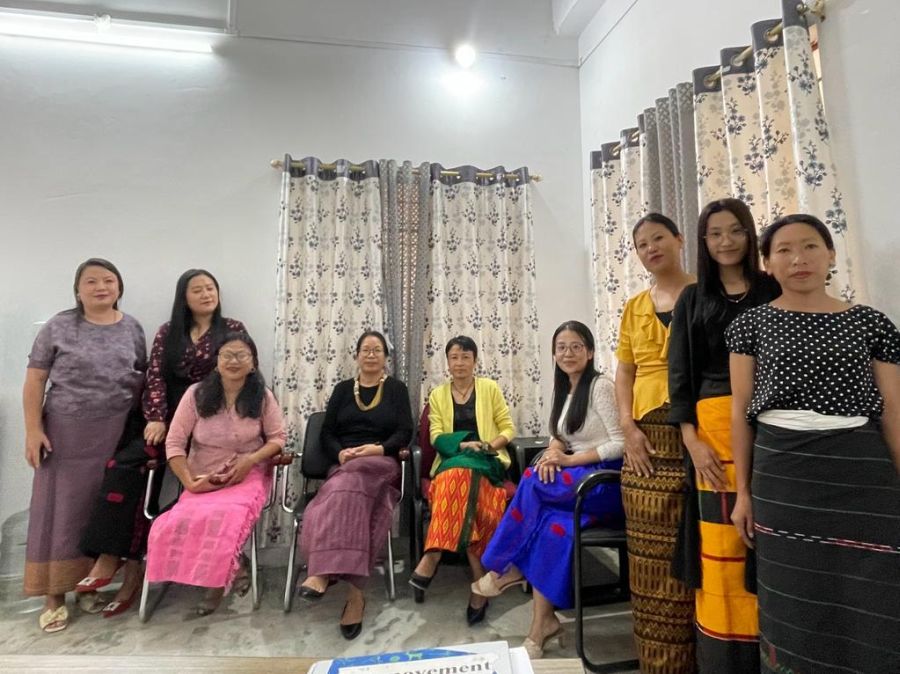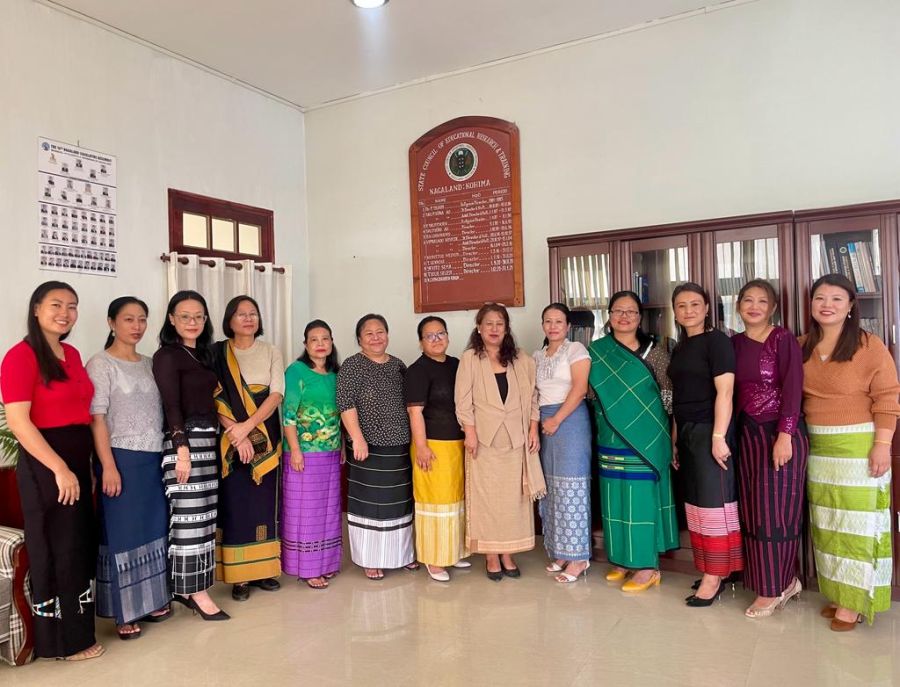The ‘Mekhela Wednesday’ movement is helping women embrace their ethnic identity
Vishü Rita Krocha
Kohima | August 18
A firm believer of bringing one’s whole self to work including “our faith, our values and our identity,” Meripeni Zares Ezung, Additional State Protocol Officer is revolutionising the way people dress to work through ‘Mekhela Wednesday’, a rare initiative to popularise mekhela as a workwear.

On May 17—the day that marks the first ‘Mekhela Wednesday,’ there were just about 20 of them including friends and colleagues joining the initiative, which she had not envisioned beyond the Nagaland Civil Secretariat. While she has not kept track of the growing number of women showing up to work in mekhela, the momentum has quickly picked up and has now spread over educational institutions and departments across the state.
Women who share the love for mekhela are taking the ‘Mekhela Wednesday’ movement to institutions and departments including Mount Hermon Higher Secondary School, Departments such as School Education and SCERT with the Department of Industries going a step ahead by formally launching ‘Mekhela Wednesday’ supported by the Director and the officers. Nagaland House, Guwahati has also joined the movement.
%20with%20others%20on%20one%20of%20the%20Mekhela%20Wednesdays.jpg)
“Friends from outside Nagaland have joined Mekhela Wednesday,” she highlighted while relating that, “even at G20 Secretariat, a friend who visited the State wore her Mekhela in solidarity and has asked for more mekhela orders. Her IFS friend posted in Hongkong reached out saying she wants to buy and wear the Naga Mekhela. I connected her to local weavers on Instagram. A young colleague even created a ‘Mekhela Wednesday’ GIF on Instagram.”
‘How betrayed & odd one would feel to hear a Naga say, I don’t eat Naga food’
Emphasising that we have somehow normalised NOT wearing Mekhela at all, Meripeni Zares Ezung put across that, “Had it been a shoe or a bag, we don’t mind spending few thousands over it but Mekhela just isn’t worth it just because we don’t wear it.” “What if we just get around to wearing them? Not only on special events but as a work wear too!” she further posed.

She also recalled how her mother mentioned about this particular local weaver who would show up in the house couple of times a year with a mekhela she had weaved, literally begging her mother to buy it because she needed money.
Stating that “stories such as this were alarming to me,” she expressed that, “one time there were two mekhelas hand-woven by the same woman.”
She bought one and tried to help sell the other, which was met with responses such as: “Oh! It’s so pretty but I don’t wear mekhela.”
“We were becoming a generation that didn’t bother to buy mekhelas or wear them and it was directly affecting our weavers,” she went on to say. As she went on to initiate ‘Mekhela Wednesday’, she expressed, “what better way to embrace our ethnic identity by taking our mekhela to work at least once a week.”
“Our mekhela is more than an attire – wear it – It’s our story! By wearing mekhela, you are supporting another woman, another weaver, another story”, she further emphasised while putting across that, “We take pride in our identity, our culture, our songs, our food and it’s time we take pride in our attire too!”
‘Every Mekhela has a story’
On August 16 ‘Mekhela Wednesday’, Meripeni Zares wore a mekhela that emerged out of her native village called Ezungpvui Mekhela even as she explained that, “It honours an Ezung woman who took the enemy’s head singlehandedly with her “tsutem” while weaving.”
“This is just one story behind a mekhela. Imagine how many legendary stories there are behind all the tribal mekhelas. Mekhelas have stories woven in it. And we also weave our own personal stories in the mekhelas we wear,” she put across.
Insisting that every Mekhela has a story, she also related how a Konyak mekhela wearer “narrated a beautiful story about a remotely located village in Mon from where the Mekhela was woven and how their church has established connection there.”
“They also discovered that the womenfolk in this particular village were such good weavers and hence, the Konyak mekhela. We simply had to pray for the village after hearing the story,” she added.
Another one, she articulated, “is a woman who wore a mekhela belonging to another tribe which has been with her for about 20 years – a gift from her ex.”
“I have started buying Mekhelas to celebrate every milestone. And how beautiful it would be to pass down these heirlooms along with a story. We are not only keeping our culture alive but passing on stories to the next generation too,” she expressed.
Stating that, “I’m most gratified that women have owned it as their own movement for their love of mekhela”, along the way, she has made a few new mekhela loving friends as well. “Women who have never worn or bought Mekhela donning it with pride every Wednesday and also looking to add to their collection and that natural camaraderie that comes on in a friendly smile when you come across other women in mekhela on Mekhela Wednesday” she insisted is “special” while also articulating that “Mekhela brings us together.”
She also strongly believes that by taking our Mekhela to work at least once a week, we are popularising mekhela as a work wear which is not just limited to some Sundays and special events. A growing number of enthusiastic mekhela lovers and buyers, she pointed out, would also make our local weavers thrive besides stating belief that “Mekhela is a symbol of our strength and courage and what a statement we women make by taking it to work.”
“We are known for taking pride in who we are as people – our culture, our food, or history our songs- so why not our attire and take our Mekhela to work on a Mekhela Wednesday,” she expressed. Interestingly, friends in Dimapur district are also eagerly waiting for the weather to mellow down so they can join the ‘Mekhela Wednesday’.
Source: http://morungexpress.com/nagaland-nurturing-identity-through-attire







 What Does Your Face Say About Your Health?
What Does Your Face Say About Your Health? The Top Viral YouTube Videos of 2017
The Top Viral YouTube Videos of 2017 An orbiting message of peace
An orbiting message of peace Meet R.N. Ravi, who is mediating peace with the Nagas
Meet R.N. Ravi, who is mediating peace with the Nagas










Leave a Reply
Your email address will not be published. Required fields are marked (required)